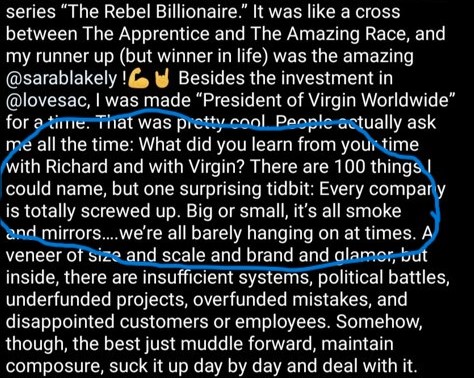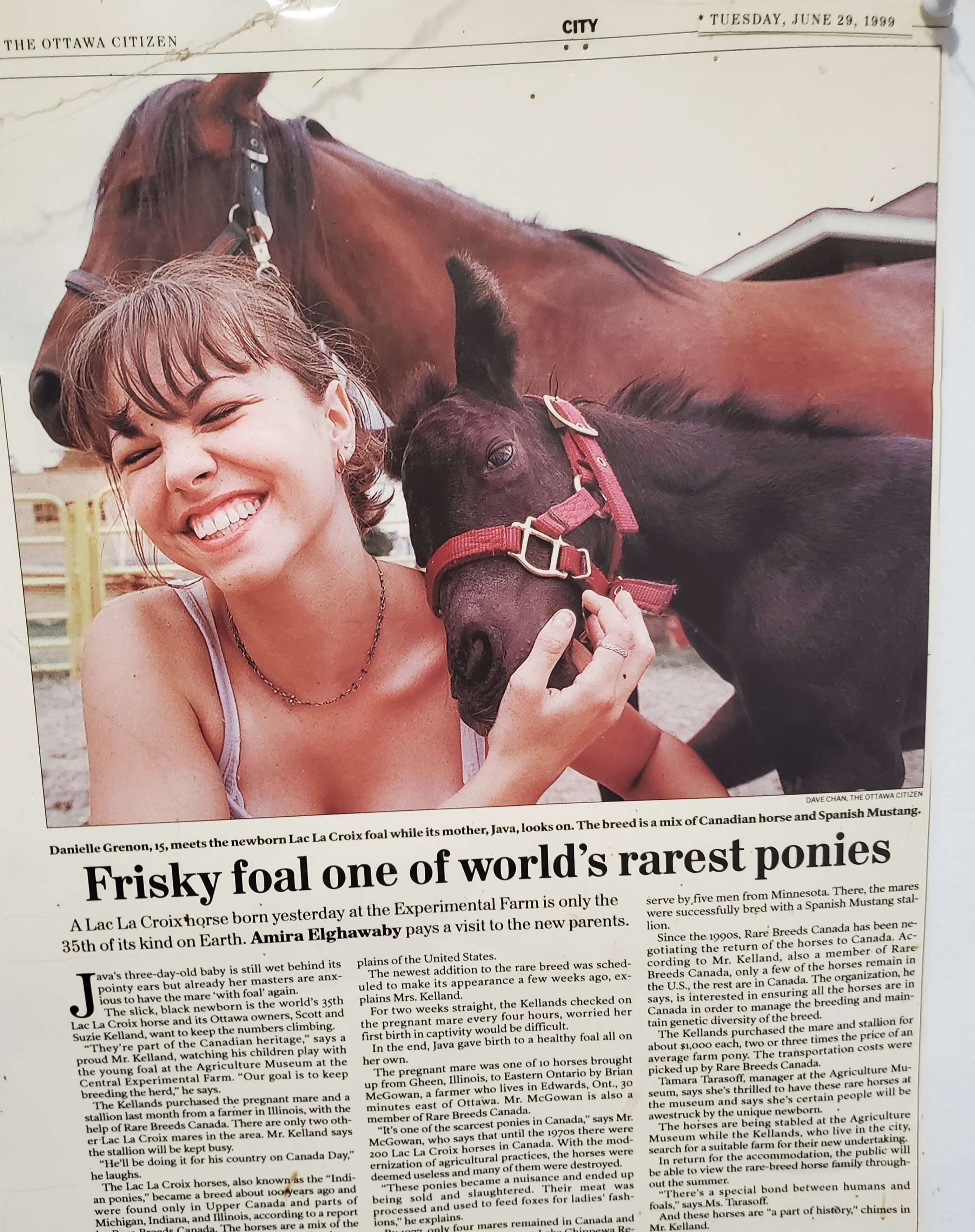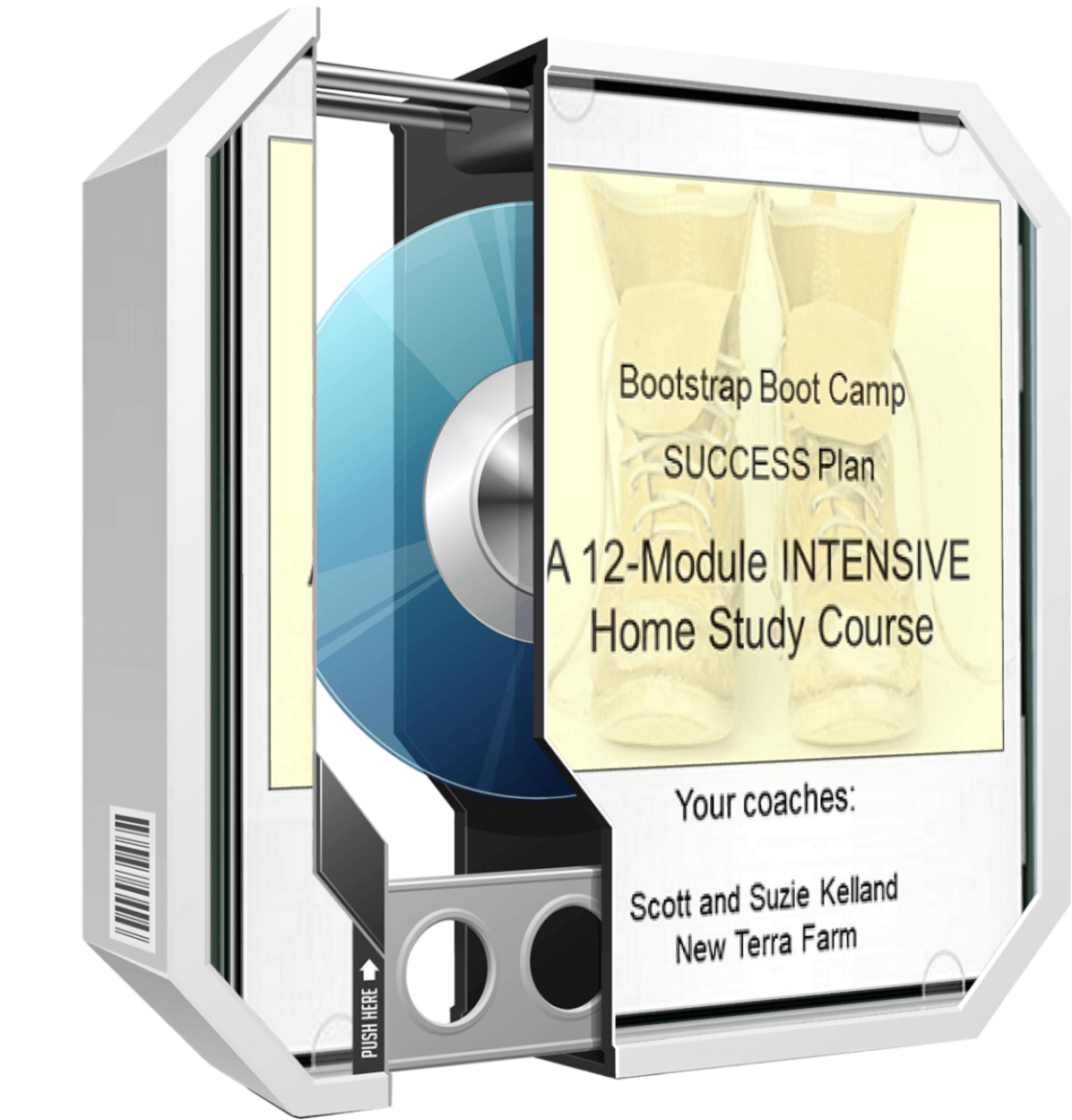Staying Sane in the Farming Game
 Some practical help for staying sane in the farming game
Some practical help for staying sane in the farming gameThis article is a little different than my usual writing about the tools and techniques of profitable farming. But it might be timely advice as you head into your new growing season.
If you have been farming for a while, you don’t need a government study to tell you this is a stressful business.
Farmers are often in contentious relationships with markets, mother nature and regulations from that aforementioned government.
I’ve been battered and bruised by each of those at one time or another. Over 20-plus years on the farm I’ve been flush, I’ve been broke, and one time I was completely wiped out by a 20-minute mid-July hailstorm that destroyed my market garden. Pretty sure every farmer could tell you a comparable disaster story.
But how do you get through it? How do you bounce back from setbacks and persist in your chosen profession?
Winston Churchill said, “If you're going through hell, keep going". Inspiring, but not really actionable.
I have a couple suggestions. In my ‘other life’ as a performance improvement expert I was often responsible for keeping teams on-track through the ups and downs of project implementation. Some of the things I learned in that career are still useful to me today.
So here’s my perspective on farmer mental health, i.e. staying sane in the farming game, for the long haul. Since I like to give practical advice about things that have actually worked for me, this article will focus on four tools that have helped me over come setbacks and keep on keepin’ on:
1. Acceptance;
2. Appreciation;
3. Alignment;
4. ACTION!
You might call this 'bringing my A-Game’!
First, the Good News...
Here’s some comfort. There are two truths I’ve learned over three decades working as a 'fixer' in the private and public sector, consulting to business and government, and toiling away on my small farm:
Truth 1: EVERY business is messed up;
Truth 2: You are NOT the exception to Truth 1 (me either).
That might not seem like good news, but it really is because, it means you are not a special screw-up , everybody gets punched by reality sooner or later.
Here’s a quote from Shawn Nelson, the co-founder of a company called Lovesac. In 2005 Shawn won the Rebel Billionaire Contest sponsored by Richard Branson.
 It's all smoke and mirrors
It's all smoke and mirrorsShawn also notes there is really just one thing that separates the survivors of business setbacks from the also-rans: Persistence.
So with that preamble out of the way, let’s look at the first of our four tools to help you persist in the face of trouble and turmoil: Acceptance.
Tool 1: Acceptance
Acceptance means acknowledging the reality of setbacks. Denying reality is a losing game, leading only to frustration and anger. You get out of this vicious circle by accepting what is.
Note: ‘Acceptance’ is NOT ‘Surrender’. The ultimate goal remains to take action to address the setback as best you can. But you can’t find solutions when you are face-down in the rut of denial. You need to lift your head a little to be able to see solutions.
It's OK to whine and complain for a bit about a problem, but do it consciously and put a time limit on it! I sometimes walk out into my barnyard where I can kick a problem around and soundly curse out the benighted individuals who are responsible for it.
Venting is OK, as long as you CHOOSE to do it, and choose when it will end.
When I coached project teams, it was inevitable there would be problems. It’s rare to have the full span of control to complete a project without other, sometimes-competing interests getting involved.
And the team would just as inevitably begin to b*itch and moan about how unfair this was.
I would let them have a few minutes to vent, and then tell them ‘yes, yes, how horribly unfair, no one in the history of projects has ever suffered the way you are suffering, and yes we are currently stuck - NOW WHAT’? What do we do about this horrible situation and the terrible people who are being so unkind to us?
And of course, their first reaction would be ‘We can’t do nothin’! We’re screwed’!
Which brings us to the second tool – Appreciation.
Tool 2: Appreciation
 Possibly the meanest-yet-funny headline I have ever seen!
Possibly the meanest-yet-funny headline I have ever seen!So, back to the team. My next response with this team would be to remind them of the progress we’ve made and the problems we’ve already solved along the way.
This is how you shift focus to the mindset needed to look for solutions.
"Look on the bright side guys, 3 months ago you wouldn’t have understood enough to KNOW how screwed we are"!
(Yes, this is intended to be a ‘pattern interrupt’ as the great guru Tony Robbins would say).
"Look what we’ve built since then and appreciate that we have solved all problems up to now, and we’ll keep on doing that until we wrap this project".
On a personal note, when I’m out in my yard and finished venting about the unfairness of the universe, I take the time to appreciate my surrounding and the things I have accomplished here.
By the way, I like the term ‘appreciation’ rather than ‘gratitude’ in this context. ‘Gratitude’ to me suggests things I have been given, while ‘appreciation’ includes things that came about by my own efforts.
So I think about the things I have built, the challenges overcome, the people I’m lucky enough to have in my life. Puts this latest little problem in perspective.
How does this problem stack up against the fact that I have a loving wife who has supported everything I’ve tried for more than 30 years, two amazing kids and 3 awesome grandkids, and I’m living on the freakin’ farm of my dreams!
So next I would ask my team to explain all the many myriad ways in which we are screwed i.e. let’s define the nature of this setback and the impact on our operation, because defining it with the logical mind is the first step to lifting the emotional mind out of the rut of despair (and inaction).
Now that we're in the right head space, let’s think about the scope of possible solutions to our setback. We do that by considering alignment.
Tool 3: Alignment
Of course the first question is ‘Alignment with WHAT?’ Alignment to the Vision and Mission of the organization and the original Goals of the project.
Here’s a picture to demonstrate the answer to that question:

Vision
is what you want your business to become.
Mission is what your business does - e.g. selling farm-fresh veggies, herbs and fruit to local families.
Goals are specific measurable targets or achievements - e.g. you want to achieve gross sales of $100,000 for 2024
Projects
are intended to achieve goals - e.g
you will need to build a processing and storage area for your produce before
delivery to support $100K sales
Tasks are the step-by-step activities required to deliver on projects e.g. acquiring the space, materials, equipment, and skills (your own or borrowed) to build the processing area.
If these are aligned, you will almost automatically do the right things and hopefully do things right.
So your alternate solution needs to support your original goals.
How to get 'Unstuck'
When we were seemingly stuck on a project, or suffered a setback I would take the team back to first principles i.e. when we set out what problem were we trying to solve, or what condition were we trying to improve?
Then we can brainstorm alternate ways to get the same result.
There’s an old marketing saying ‘people don’t want ½ inch drills, people want ½ inch holes’.
In other words, don't confuse tactics vs. results.
Maybe we need to renegotiate the terms or timeline of the project. Maybe we will need additional resources. Or maybe the team’s energy needs to be redirected into new tasks.
If you understand the goal, you can usually find other possible ways to achieve it.
You an also research how other people have solved the same
problem or overcame a similar setback. Find out how they did it, and do what
they did. Here's a fun read that will tell you more about that.
Sometimes you can throw money at a problem. When we launched out first CSA market garden, we were prepared to grow just about everything in quantity using mainly our hand tools.
Growing enough potatoes was going to be a problem. The trenching, hilling and digging was going to consume a LOT of time and energy.
At the same time potatoes are pretty much a staple crop. So I checked around, and found a local organic farmer that grew a lot of potatoes. She agreed to supply me for the season. I ran the numbers and the idea was feasible. Even buying my potatoes from her, we still made a good profit.
Sometimes you need to be innovative and work your resources and your network. When we acquired our first two Lac la Croix ponies, we were still living in a 3-bedroom house in Ottawa. The farm was still in the future.
Boarding two ponies would be horrendously expensive, and my tiny backyard did not have room for a stable. What to do?
Well, one of my ‘resources’ was an acquaintance with some folks at the Department of Agriculture Experimental Farm in Ottawa. They exhibited many heritage breeds of animals and carried out a breeding program to maintain bloodlines.
I approached one of the Directors there and pitched the idea of a public interpretation program about our heritage breed ponies. They liked the idea, and boarded our ponies for free until we bought New Terra Farm.
Our first foal was actually born at the Experimental Farm! For publicity, we held a ‘Name the Foal’ contest that attracted media attention, and brought a LOT of families to the Farm. A big Win-Win.
The point of all this is , take your mind off the problem and start hunting for solutions that achieve the result you want.
 Our little pony foal attracted a LOT of attention to the Experimental Farm
Our little pony foal attracted a LOT of attention to the Experimental FarmTool 4: Taking ACTION!
This is where the rubber meets the road. ‘Appreciation’ is for past accomplishments. ‘Vision’ is the future desirable state. But you can only take 'Action' in the present.
So break down your solution into actionable steps. Plan the tasks and timeline and budget to overcome the setback and get back on track, in alignment with your Vision.
Then execute the plan!
But... What If?
What if we get our heads straight and look for solutions or ways around the setback and … nothing. It doesn’t work, or can’t be implemented given your current resources and span of control.
What then? I have been in that situation. After a series of successful projects with a Director in the Federal Public Service, we ran into a roadblock.
We just couldn’t get this one project over the goal line. We exploited all our contacts and resources and skills and experience and we got NOWHERE.
I was supposed to be the ‘expert’ and I had no more tricks in my bag. I confessed this to my client, told him I didn’t know what to do.
My Director friend then said something very wise: ‘OK, we declare this project a success, and we move on’.
In other words we’re back to Acceptance. Not all projects
work out, not all problems can be fixed. Obsessing on it will not fix it. Next challenge!
Here’s what Robert T. Kiyosaki, the Rich Dad, Poor Dad guy, says about that:
“Sometimes you win and sometimes you learn”. i.e. there is no ‘lose’.
You may have heard this expressed in the Serenity Prayer:
God grant me the serenity
to accept the things I cannot change;
courage to change the things I can;
and wisdom to know the difference.
Hopefully you can Appreciate this advice as well.
Module 2 of MY Bootstrap Boot Camp Success Plan course talks about the Power of Vision to drive business success.
Get ready for your best season ever, get Bootstrap Boot Camp only from New Terra Farm.
Speaking about 'Staying Sane in the Farming Game'
FYI I'm also a speaker on topics related to small rural business. If you want me to speak at your organization, contact me through my Speaker's Page.
- Home
- Micro Farm Profit
- Staying Sane In The Farming Game
Recent Articles
-
A 52 week harvst to stretch and your income
Apr 16, 25 07:48 AM
A step by step approach to build a 52 week harvest plan for more yield and more income -
Backyard Garden Profits your key to a successful small market garden
Apr 06, 25 05:38 AM
I wrote Backyard Garden Profits for the small grower who wants to launch a successful side hustle gardening for money. Practical actionable advice small-scale growers who want to earn more, waste less… -
Homesteader Book Bundle only from New Terra Farm
Apr 01, 25 04:58 PM
If you have a hankerin' for country living, my best value Homesteader Book Bundle is a great resouirce.



